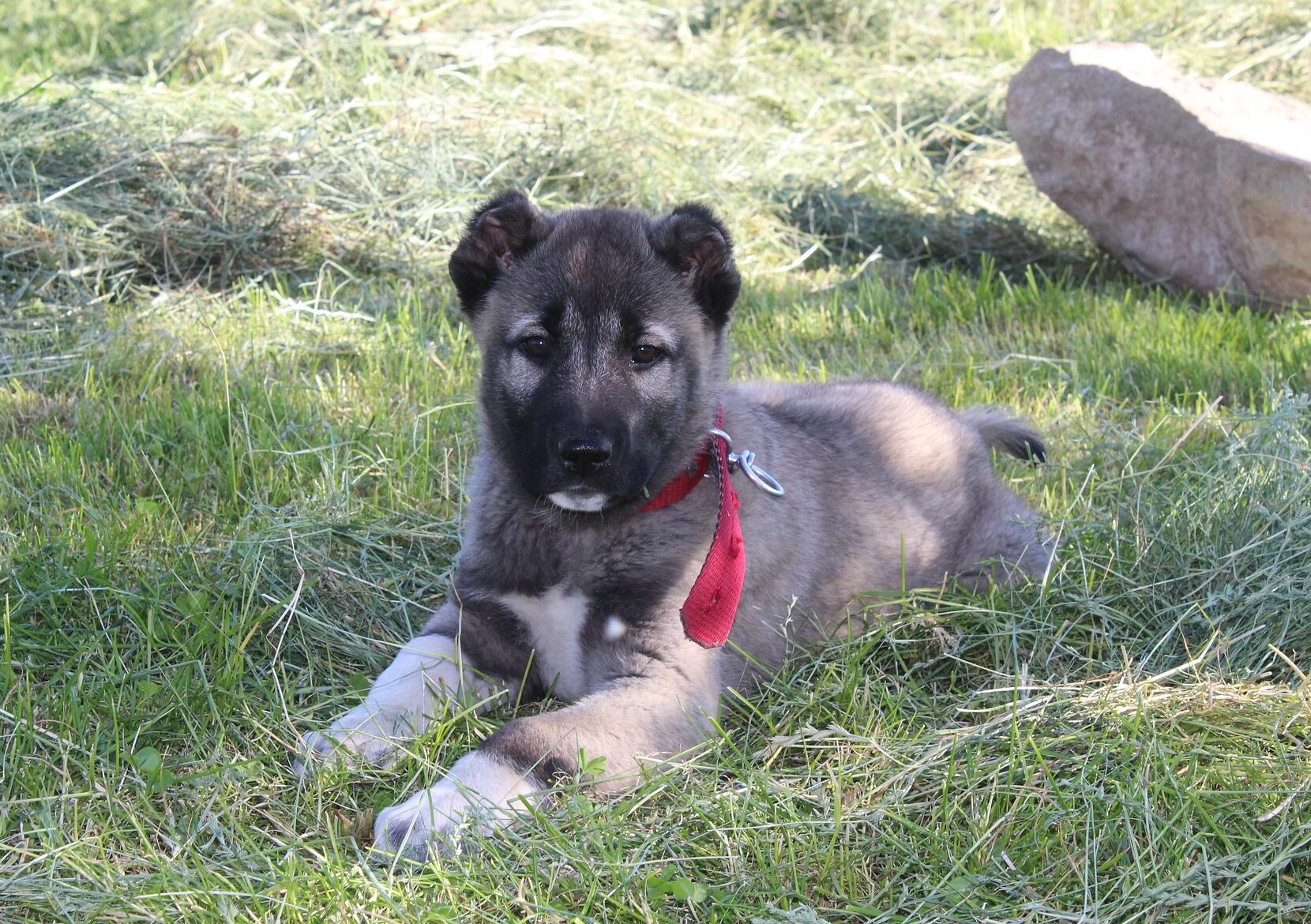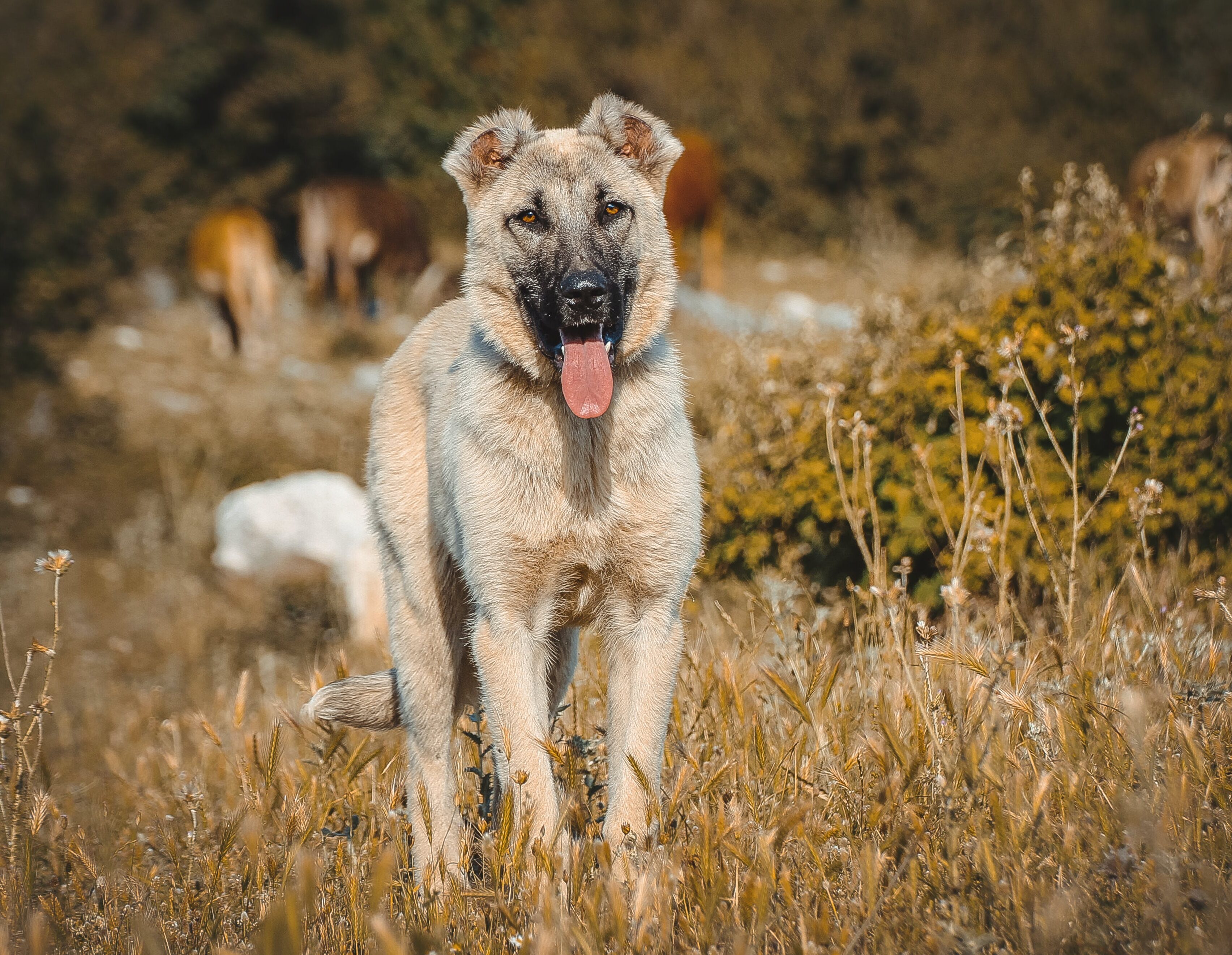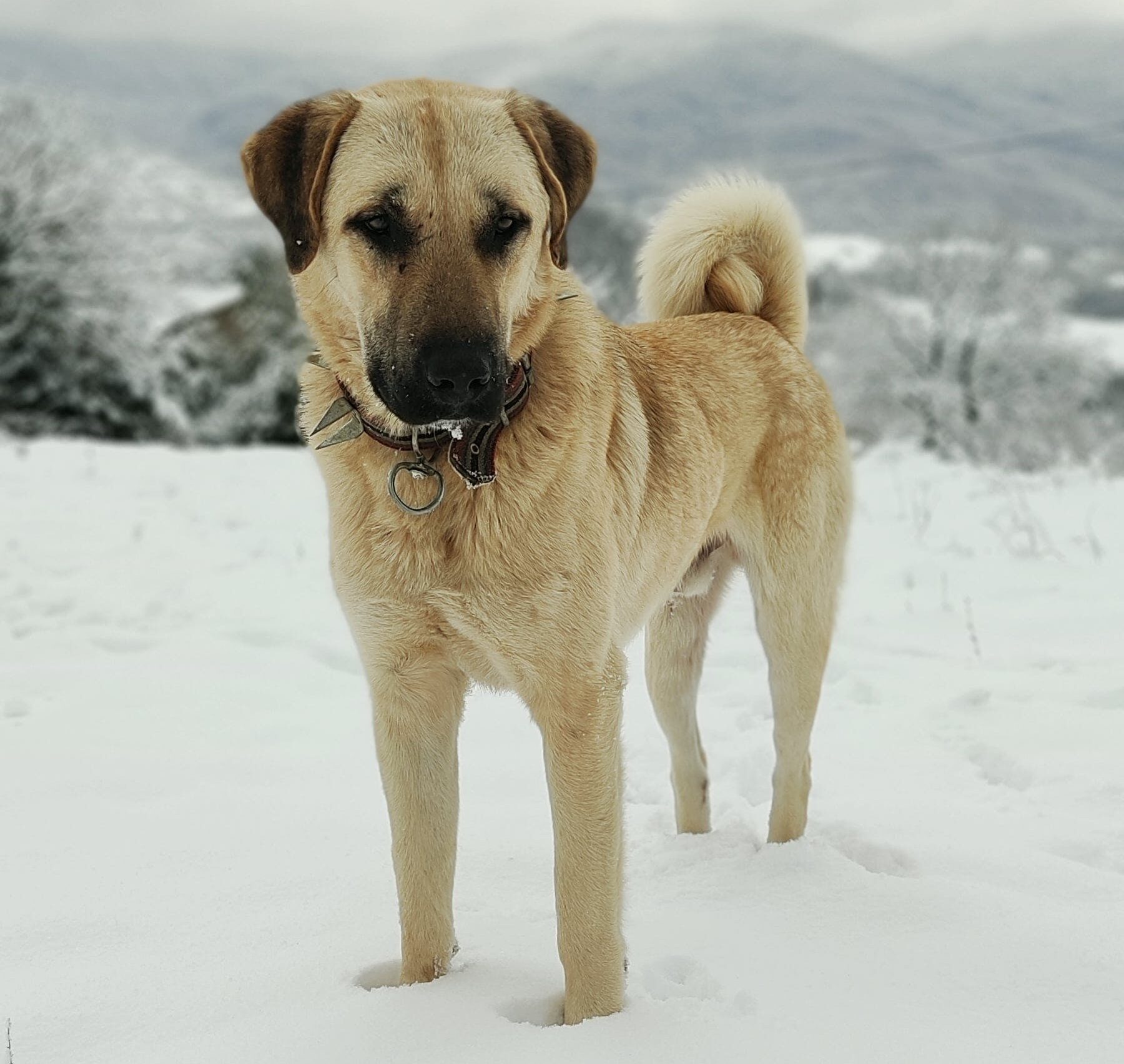The Kangal is a unique type of dog known as the Kangal Shepherd or the Turkish Kangal. It is a large and powerful breed that originated in the town of Kangal in the Sivas province of Turkey.
Originally bred as livestock guardian dogs, Kangals are known for their protective nature and powerful build, making them excellent guardians for livestock against threats such as wolves and bears. In this article, we will cover all the essential dog breed information, including their history, grooming, weight considerations, training, and common health concerns.
- Kangals are protective livestock guardians from Turkey.
- They have a double coat and a black mask appearance.
- Require low-maintenance grooming; prone to heavy shedding.
- Training for socialization and obedience is essential.
- Prone to health issues like hip dysplasia and bloating.
The information provided herein is for informational purposes only. Please refer to our disclaimer for more details..
What is a Kangal Dog?
Image credits: DEGDAS
The Kangal dog breed is an ancient livestock guardian breed that was first developed in the town of Kangal in Turkey. Their origin can be traced back to the Sivas province, where they were primarily used to protect livestock.
Known for their muscular build, protective instincts, and preference to intimidate rather than attack if necessary, Kangals have earned a reputation as one of the most powerful guardian breeds.
The Kangal dog breed was first developed in the Sivas province of Turkey, where they were selectively bred for their protective nature and ability to protect livestock.
Their guardianship has played a pivotal role in the success of livestock farming for centuries past. They have also been an integral part of Turkish culture for centuries, serving as invaluable assets to shepherds and farmers in safeguarding their herds against potential threats from predators.
Physical Characteristics and Appearance of Kangal Dogs
Kangal dogs are large and muscular, with males typically standing between 28 to 34 inches at the shoulder and weighing between 110 to 145 pounds.
They possess a distinctive double coat, with a dense undercoat to provide insulation and a protective outer coat that helps shield them from the elements. The breed’s appearance is further accentuated by their signature black mask, adding to their impressive and intimidating presence.
In addition to their dominating physical presence, Kangal dogs are also highly intelligent and trainable. With proper socialization and training, they can be well-behaved and obedient companions.
They have a calm and composed demeanor but are always alert and ready to act if they perceive a threat to their family or territory.
Due to their size and strength, Kangal dogs require plenty of exercise and mental stimulation to keep them happy and healthy.
They thrive in large, open spaces where they can roam and explore, and they excel at activities such as hiking, running, and agility training. Despite their imposing appearance, Kangal dogs are known to be gentle giants when raised and trained with love and care.
How to Groom a Kangal
Image credits: Ramazan Erdem
Grooming requirements for Kangal dogs are relatively low maintenance, thanks to their short and dense double coat. Regular brushing to remove loose fur and debris is essential, especially during shedding seasons, to keep their coat healthy and free from mats and tangles.
Regular brushing with an appropriate grooming tool can help distribute natural oils and prevent mats from forming in the dense coat of Kangal dogs.
Bathing should be done sparingly to avoid stripping the coat of its natural oils, which are essential for insulation and protection. Additionally, routine nail trimming and dental care are crucial aspects of grooming to ensure overall health and comfort for the Kangal.
Kangal dogs have a seasonal shedding cycle, during which their undercoat sheds heavily. During this period, more frequent brushing is necessary to manage the shedding and minimize the accumulation of loose fur in the home.
A balanced diet rich in essential nutrients can also contribute to the overall coat health and reduce excessive shedding.
What is the Healthy Weight for a Kangal Dog?
When determining the appropriate weight for a Kangal dog, several factors should be considered, including the dog’s age, gender, and activity level. Generally, adult Kangals should maintain a healthy weight ranging between 110 to 145 pounds, depending on their size and build.
Feeding a high-quality, balanced diet that aligns with the nutritional needs of Kangal dogs is crucial for maintaining an optimal weight.
Portion control and monitoring calorie intake are essential, as Kangals tend to gain weight if overfed. It’s important to avoid overfeeding and provide regular exercise to keep them at a healthy weight and prevent obesity-related health issues.
Regular exercise is essential for Kangal dogs to help them maintain a healthy weight and stay physically fit. Engaging in activities such as daily walks, interactive play sessions, and mentally stimulating exercises can help prevent weight gain and contribute to their overall well-being.
How to Train a Kangal for Socialization and Obedience
Image credits: Leonor Grenno
Effective socialization and obedience training are critical for Kangal puppies to ensure they develop into well-mannered and well-adjusted companions. Early socialization, beginning in puppyhood, helps them become accustomed to various stimuli and environments, reducing the likelihood of developing fearful or aggressive behavior.
Consistent and firm yet gentle training methods are recommended for teaching obedience commands to Kangal dogs. Utilizing positive reinforcement techniques and rewards for desired behaviors can help motivate them to respond positively to training and strengthen the bond between the dog and the owner.
Kangal dogs are naturally protective and territorial, and it’s important to address and manage these traits through early exposure to social settings and proper training. Positive experiences with visitors and exposure to different situations can help prevent their protective instincts from escalating into unwarranted aggression.
Common Health Concerns for Kangal Dogs
Hip dysplasia, a genetic condition affecting the hip joints, is a common concern in Kangal dogs. Regular veterinary check-ups and screening for hip dysplasia can aid in early detection and appropriate management of this condition.
Routine health screenings, vaccinations, parasite control, and dental care are vital components of preventive healthcare for Kangal dogs. Regular examinations by a veterinarian can help identify and address potential health issues before they escalate.
Another health concern in large-breed dogs is bloating, also known as gastric dilatation-volvulus (GDV). This is a life-threatening condition in which the stomach fills with gas and twists on itself, cutting off blood supply and leading to potential organ damage.
Feeding multiple smaller meals throughout the day and avoiding strenuous exercise before and after meals can help reduce the risk of bloat in your Kangal.
Like many large breeds, Kangal dogs are also prone to joint issues such as arthritis, as well as heart problems, and certain types of cancer.
Kangal owners need to be aware of these potential health issues and work closely with a veterinarian to ensure their pet’s overall well-being. By staying proactive with healthcare and providing a loving and nurturing environment, Kangal owners can help ensure a long and healthy life for their beloved canine companions.
Temperament and Behavior Traits of Kangal Dogs
Known for their protective and territorial nature, Kangal dogs exhibit strong loyalty and possessive instincts towards their family and the livestock they guard.
While they are typically calm and affectionate with their human family members, they can display assertive behavior when protecting their territory. Early exposure to different environments, people, and situations is essential to temper their guardian instincts and encourage positive interactions with other pets and humans.
When properly trained and socialized, Kangal dogs can be gentle and affectionate with their human family members. They are also known to be great with children and are typically very protective of them.
However, due to their strong protective instincts, they can be wary of strangers and may need early and ongoing socialization to ensure they are well-adjusted around new people and other pets.
In addition to their loyalty, Kangal dogs are known for their independence and can be quite stubborn at times.
They require a confident and consistent owner who can establish themselves as the pack leader and provide firm, yet fair, guidance. It is important to give Kangal dogs plenty of mental and physical stimulation to prevent boredom and destructive behavior.
Overall, Kangal dogs are a devoted and protective breed that can make excellent guardians for both livestock and families. With proper training, socialization, and leadership, they can be loyal and affectionate companions while still maintaining their strong protective instincts.
696views
Share on FacebookExplore more of these tags
I'm not sure why BP is posting these kinds of articles on dog breeds, but I'd like to say that, despite what "Liv Rogowski" the veterinary technician says (she's not a veterinarian, btw, but a vet tech), livestock guardian breeds are NOT good "pet" dogs. One of my dogs is only HALF livestock guardian breed (Kuchi Dog, also known as the Afghan Shepherd) and he is nearly intractable. Livestock guardian breeds are VERY independent and can be VERY stubborn and hard to train. They want to do their "job" INSTINCTIVELY. They are not always super affectionate or super playful. If you want a good family dog, get a Lab or a German Shepherd.
I'm not sure why BP is posting these kinds of articles on dog breeds, but I'd like to say that, despite what "Liv Rogowski" the veterinary technician says (she's not a veterinarian, btw, but a vet tech), livestock guardian breeds are NOT good "pet" dogs. One of my dogs is only HALF livestock guardian breed (Kuchi Dog, also known as the Afghan Shepherd) and he is nearly intractable. Livestock guardian breeds are VERY independent and can be VERY stubborn and hard to train. They want to do their "job" INSTINCTIVELY. They are not always super affectionate or super playful. If you want a good family dog, get a Lab or a German Shepherd.

 Dark Mode
Dark Mode 

 No fees, cancel anytime
No fees, cancel anytime 





















































-2
1